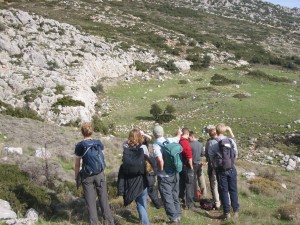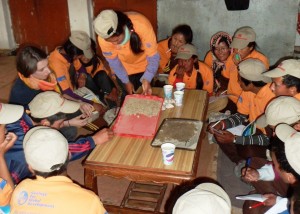We’re expecting a strong GfGD presence again at the European Geosciences Union General Assembly in 2015. We note below a number of relevant sessions that our readers may like to get involved with.
Deadline for abstracts is 7th January 2015.
NH9.4/EOS19
**Natural Hazards Education, Communications and Policy-Practice Interface**
This session addresses how we communicate and educate students, the public, policy makers, and practitioners about natural hazards. Although we welcome all contributions in this topic, we are particularly interested in: (i) The communication (by scientists, engineers, the press, civil protection, government agencies, and a multitude other agencies) of natural hazards risk and uncertainty to the general public and other government officials; (ii) Approaches that address barriers and bridges in the science-policy-practice interface that hinder and support application of hazard-related knowledge; (iii) The teaching of natural hazards to university and lower-level students, using innovative techniques to promote understanding. We also are specifically interested in distance education courses on themes related to hazard and risk assessment, and disaster risk management, and in programmes for training in developing countries. We therefore solicit abstracts, particularly dynamic posters, on all aspects of how we communicate and educate the better understanding of natural hazards. The ability to have graphic screens at poster sessions is available (if pre-ordered through EGU), as is a location to put hands-on demonstrations or other material. We are initially planning poster (or a PICO) session, combined with opportunity for those who want to orally present to the rest of the group, and ample time for discussion.
EOS8
**Geoethics for Society – General Aspects and Case Studies in Geosciences**
Geoethics consists of research and reflection on the values which underpin appropriate behaviours and practices, wherever human activities interact with the geosphere. Geoethics deals with the ethical, social and cultural implications of Earth Sciences education, research and practice, and with the social role and responsibility of geoscientists in conducting their activities. As scholars and experts on some of the most urgent problems affecting our planet, geoscientists can play a fundamental role in society, thanks to their unique range of skills, by helping to meet human needs and address environmental problems at the local and global scale, and by providing information and expert advice to support informed decision-making and public debate. Education, at all levels, must be re-oriented to give 21st century citizens a better understanding of natural systems and our interactions with them, and to equip them to participate in debate about the challenges of living equitably and sustainably on our planet. Geoscientists have a great deal to contribute to this re-orientation. The conveners invite abstracts on both practical and theoretical aspects of Geoethics, including case studies. The aim of the session is to develop ethical and social perspectives on the challenges arising from human interaction with natural systems, to complement technical approaches and solutions, and to help to define an ethical framework for geoscientists’ research and practice in addressing these challenges.
EOS12
**Geoscientists as Communicators**
 Communication of the scientific process and its subsequent results is done to achieve a variety of objectives depending on the stakeholders involved: from generating awareness and stimulating interest in children to influencing policy and practice at national and international levels. Giving the numerous fields that the geosciences encompass, the complexity of the subjects and issues and the debate they can spark, and the variety of audiences that can be targeted, good communication is vital and as such there is a need to develop and share ways of communicating and measuring the impacts of communication and outreach efforts provided by our community. In this session we invite applied and theoretical contributions that cover the following topics: (1) Should geoscientists act as communicators? (2) Communication in practice and (3) Evaluation of communication. We particularly encourage submissions of examples of communication initiatives (via any type of tools from websites to lectures and exhibitions), whether successful or ineffective, to encourage shared learning and development towards best practice. To allow meaningful discussions and debates, we encourage geoscientists from all fields as well as journalists and communication experts to submit an abstract in our session.
Communication of the scientific process and its subsequent results is done to achieve a variety of objectives depending on the stakeholders involved: from generating awareness and stimulating interest in children to influencing policy and practice at national and international levels. Giving the numerous fields that the geosciences encompass, the complexity of the subjects and issues and the debate they can spark, and the variety of audiences that can be targeted, good communication is vital and as such there is a need to develop and share ways of communicating and measuring the impacts of communication and outreach efforts provided by our community. In this session we invite applied and theoretical contributions that cover the following topics: (1) Should geoscientists act as communicators? (2) Communication in practice and (3) Evaluation of communication. We particularly encourage submissions of examples of communication initiatives (via any type of tools from websites to lectures and exhibitions), whether successful or ineffective, to encourage shared learning and development towards best practice. To allow meaningful discussions and debates, we encourage geoscientists from all fields as well as journalists and communication experts to submit an abstract in our session.


Pingback: Geology for Global Development | #EGU15 – Some Sessions of Interest (2) – Natural Hazards and Society